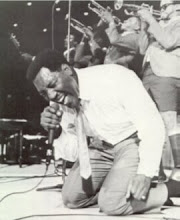 The most difficult part in celebrating Isaac Hayes' 65th birthday is having to pick just 2 or 3 tunes from his vast catalog to share. Isaac's influence on music in the 60's and 70's is unparalleled. The self taught musician started his career at Stax Records as a saxophone player for The Mar-Kays and a piano player for the Stax house band, but Isaac would truly shine as a songwriter. Along with his writing partner David Porter, Isaac Hayes penned over 200 songs for Stax including When Something's Wrong With My Baby, B-A-B-Y, Hold On I'm Coming, and Soul Man. With his 1967 release Presenting Isaac Hayes, he stepped out from the shadows launching his solo career that truly ignited with 1969's Hot Buttered Soul. With his clean shaven head (an oddity in 1967), omnipresent shades and gold chains Isaac became one of the most unique figures in all music. 1971 found Isaac Hayes at his peak winning the Oscar for his theme from Shaft which was a number one hit that year. Hayes never stopped making music and although he's probably more well known to many as Chef on South Park, the music he created is what makes him a legend.
The most difficult part in celebrating Isaac Hayes' 65th birthday is having to pick just 2 or 3 tunes from his vast catalog to share. Isaac's influence on music in the 60's and 70's is unparalleled. The self taught musician started his career at Stax Records as a saxophone player for The Mar-Kays and a piano player for the Stax house band, but Isaac would truly shine as a songwriter. Along with his writing partner David Porter, Isaac Hayes penned over 200 songs for Stax including When Something's Wrong With My Baby, B-A-B-Y, Hold On I'm Coming, and Soul Man. With his 1967 release Presenting Isaac Hayes, he stepped out from the shadows launching his solo career that truly ignited with 1969's Hot Buttered Soul. With his clean shaven head (an oddity in 1967), omnipresent shades and gold chains Isaac became one of the most unique figures in all music. 1971 found Isaac Hayes at his peak winning the Oscar for his theme from Shaft which was a number one hit that year. Hayes never stopped making music and although he's probably more well known to many as Chef on South Park, the music he created is what makes him a legend.·Isaac Hayes: Do Your Thing (edited version)
This is undeniably one of Isaac's baddest grooves from 1971's Shaft soundtrack. I'm presenting the radio edit but I advise you all to check the album version that clocks in at over 19 minutes long. Right on!
·Isaac Hayes: The Look of Love
I had to try to cram at least one epic love track in here so here's Isaac's rendition of Burt Bacharach's classic from 1970's ...To Be Continued. Sorry about the low bit rate, but at over 11 minutes and limited server space I had few options. I love the jam from 4:30 on.
·Isaac Hayes: Never Can Say Goodbye
It's a cliche to say "when someone sings a song they truly make it their own", but I think that expression was made just for Isaac Hayes. There's never a doubt who's performing this cover of my favorite Jackson 5 hit. Find it on 1971's Black Moses.
 ·Sharon Cash: Fever
·Sharon Cash: Fever




